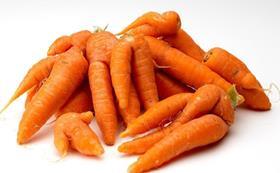
As much as a third of farmed fruit and vegetables across Europe never make it to supermarket shelves because they are deemed misshapen or the wrong size, according to a new report.
Researchers at the University of Edinburgh examined details of food loss and waste within the European Economic Area, studying how much food is discarded before it reaches the point of sale.
They found that more than 50 million tonnes of fruit and vegetables grown across Europe are discarded each year, largely because they do not meet supermarkets' and consumers' demands of how they should look.
Strict government regulations, high supermarket standards and consumers' expectations of the appearance of fruit and veg were all deemed to be a major factor in so much fresh produce going to waste. The report authors also pointed out that growers supplying a supermarket typically produce more than they need to in order to allow for a proportion that is deemed not good enough to sell.
The researchers said more education of consumers was needed, as well as a movement towards sustainable shopping and greater use of misshapen produce, for example in chopped, processed or picked goods.
A number of UK supermarkets have introduced wonky veg schemes, as well as linked with food redistribution charities, but the report seems to indicate the current work across the continent does not go far enough.
'Encouraging people to be less picky about how their fruit and vegetables look could go a long way to cutting wate, reducing the impact of food production on the climate, and easing the food supply chain,' said Stephen Porter of the School of GeoSciences at Edinburgh University.
Andrew Clark, director of policy at the NFU, stressed it is important for retail buyers to apply flexibility to food specifications and promotions in order to utilise as much of the crop as possible, as well as manage fluctuations in supply and demand.
'It costs just as much to produce wonky fruit and veg as a perfect one, so special ranges that utilise this crop can be part of the solution to address the food waste challenge, especially during the dry hot summer we're experiencing.'



